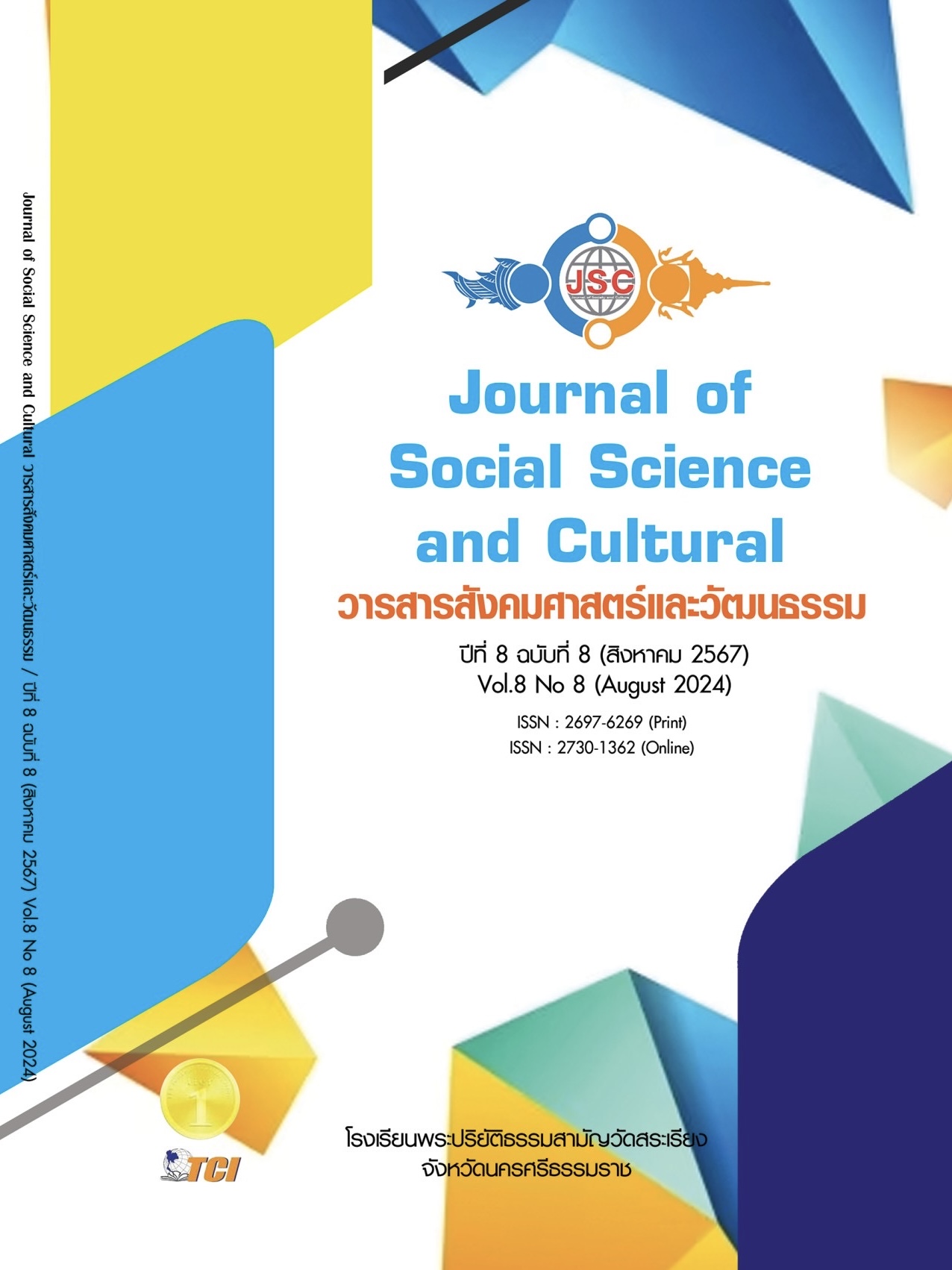PARENT INVOLVEMENT TO ENHANCE YOUTH’S CAREER SELF-EFFICACY (AGED 17 - 24)
Main Article Content
Abstract
This research aimed to 1) Study the factors that promote career self-efficacy awareness among youth, and 2) Examine the involvement of parents in promoting career self-efficacy awareness among youth. The research methods included documentary research and survey research, with data collected from 47 youths who were aware of their career self-efficacy. The researcher used a questionnaire consisting of a career self-efficacy awareness scale and a parental involvement assessment. The quality of the instruments was checked for content validity by examining the consistency between the questions and the content and objectives to be measured (Index of Consistency: IOC) by three experts. The reliability of the questionnaire was verified using Cronbach's alpha coefficient, which resulted in 0.888. The study found that youths with high career self-efficacy awareness also rated high parental involvement in career-related activities in three aspects: providing career information, fostering attitudes that lead to careers, and supporting career-related factors. These findings align with the theoretical components synthesizing the relationship between parental involvement and youth career development. Additionally, the study revealed that mothers, parents with doctoral degrees, and parents with an income or salary of 50,001 - 60,000 baht per month had a statistically significant relationship with parental involvement in supporting career-related factors.
Article Details
References
กระทรวงศึกษาธิการ. (2562). พระราชบัญญัติการศึกษาแห่งชาติ (ฉบับที่ 4) พ.ศ. 2562. เรียกใช้เมื่อ 1 กรกฎาคม 2567 จาก https://www.moe.go.th/พรบ-การศึกษาแห่งชาติ-พ-ศ-2542
กัญญาภัทร เสนีวงศ์ ณ อยุธยา. (2557). การมีส่วนร่วมของผู้ปกครองด้านอาชีพ การรับรู้ความสามารถของตนด้านอาชีพและความสอดคล้องในตนด้านเป้าหมายการเลือกเส้นทางอาชีพของนักเรียน มัธยมศึกษาตอนปลาย. ใน วิทยานิพนธ์มหาบัณฑิต สาขาจิตวิทยา. จุฬาลงกรณ์มหาวิทยาลัย.
ชุติมา ทองมีขวัญ. (2564). การเสริมสร้างการรับรู้ความสามารถในตนเองในการตัดสินใจเลือกอาชีพของนักเรียนระดับชั้นมัธยมศึกษาตอนปลายโดยชุดกิจกรรมแนะแนว. ใน วิทยานิพนธ์มหาบัณฑิต สาขาจิตวิทยาการแนะแนว. มหาวิทยาลัยศรีนครินทรวิโรฒ.
พันธุ์ทิพย์ พัชรพงศ์พรรณ. (2556). การรับรู้ความสามารถแห่งตนในการตัดสินใจเลือกอาชีพของนักเรียนระดับชั้นมัธยมศึกษาตอนปลาย โรงเรียนสาธิตมหาวิทยาลัยรางคำแห่ง. ใน สารนิพนธ์มหาบัณฑิต สาขาจิตวิทยาการแนะแนว. มหาวิทยาลัยศรีนครินทรวิโรฒ.
สมาคมที่ประชุมอธิการบดีแห่งประเทศไทย. (2566). สถิติการสอบ. เรียกใช้เมื่อ 20 มิถุนายน 2567 จาก https://www.mytcas.com/stat
สิริอร วิชชาวุธ. (2554). จิตวิทยาการเรียนรู้. (พิมพ์ครั้งที่ 1). ปทุมธานี: มหาวิทยาลัยธรรมศาสตร์.
Betz, N. E. (1992). Counseling uses of career self-efficacy theory The Career Development Quarterly. Retrieved June 25 , 2024, from https://psycnet.apa.org/record/1993-03614-001
Bronfenbrenner, U. (1994). Ecological models of human development. Retrieved July 2 , 2024, from https://ncj.nl/wp-content/uploads/media-import/docs/6a45c1a4-82ad-4f69-957e-1c76966678e2.pdf
Dietrich, J. & Kracke, B. (2009). Career-specific parental behaviors in adolescents’ development. Journal of Vocational Behavior, 75(2), 109-119.
Hornby, G. & Lafaele, R. (2011). Barriers to parental involvement in education: an Explanatory model. Educational Review, 63(1), 37-52.
Lewin, C. & Luckin, R. (2010). Technology to support parental engagement in elementaryeducation: Lessons learned from the UK. Computers & Education, 54(3), 749-758.
Morris, A. S. et al. (2020). Parent education: what we know and moving forward for greatest impact. Family Relations, 69(3), 520-542.
Roach, K. L. (2010). The role of perceived parental influences on the career self-efficacy of college students. Retrieved June 25 , 2024, from https://www.core.ac.uk/download/pdf/233569287.pdf
Taylor, K. M. & Betz, N. E. (1983). Applications of self-efficacy theory to the understandingand treatment of career indecision. Journal of Vocational Behavior, 22(1), 63-81.
Williams, T. T. & Sánchez, B. (2013). Identifying and Decreasing Barriers to Parent Involvement for Inner-City Parents. Youth & Society, 45(1), 54-74.


